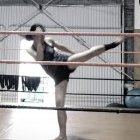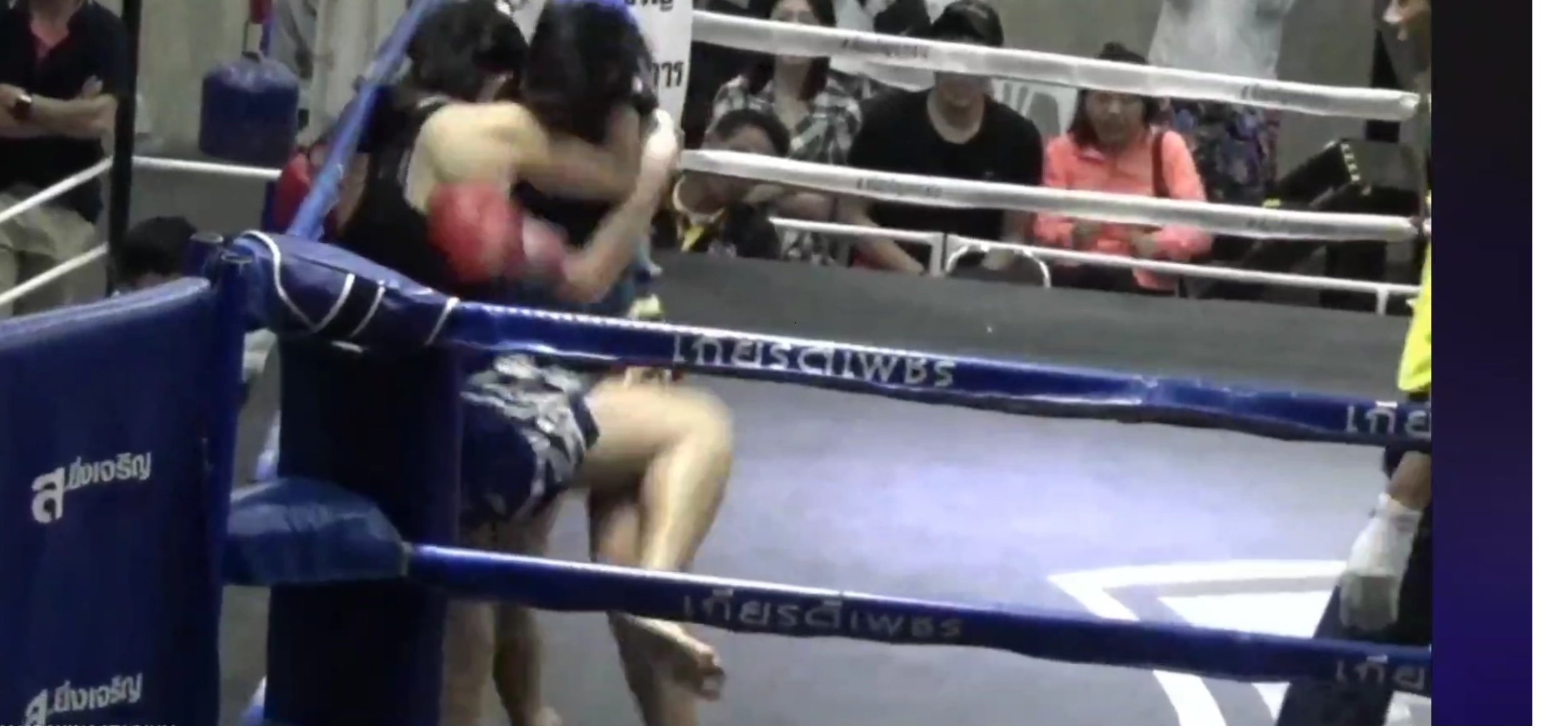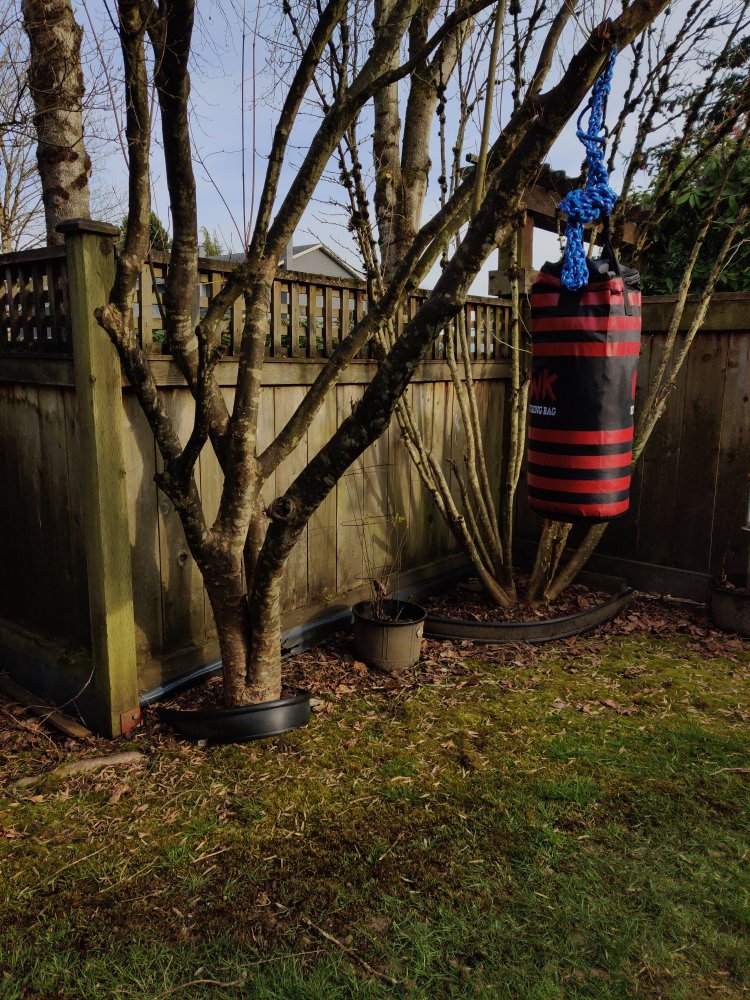-
Posts
75 -
Joined
-
Last visited
-
Days Won
17
Everything posted by Matty
-
If you can rule out flexibility and muscle stretch being the limiting factors, maybe it's worth looking into Don Heatricks explanations on fast twitch vs slow twitch muscle fibres.
-

Thai Clinch Fighting Vs Wrestling
Matty replied to Nightshade's topic in Muay Thai Technique, Training and Fighting Questions
I'm 5' tall - in my experience, if I'm clinching with someone much taller, say 5'9"ish, reaching for the head is impossible. I just don't have leverage once my hand is on the head. My arm is too extended. I usually have to go to body or neck lock. -
I had used setting intentions to get more aggressive in sparring before. I did it mostly during fight camp because aggression is important for scoring in North America. One of my intention was "to override" as in to override the opponent's intentions. I felt more comfortable with this than say, "I'm gonna knock this person out", which is not consistent with my own temperament. Maybe rephrasing your intention could help you progress. Instead of "I need to hit hard and hurt them", go with something like "I'm gonna match their energy for this round".
-
This reminds me - sometimes my instructor would have the class play shoulder tag. Stand in your fighting stance and try to tap each other's shoulders. The hand should come out the same way a jab or cross would. Eventually, the game would progress to tags to body and legs (using hands only). It gives us a chance to figure out how close we have to be to touch our partner's shoulder, and practice deflecting the other person reaching for your shoulder. And it takes "getting hit" of the table (though, you could get slapped on the shoulder pretty hard, but students don't seem worried). You'd also have to remind ppl to not to poke each other in the eye.
-

Partner padholding difficulties
Matty replied to jpmoral's topic in Muay Thai Technique, Training and Fighting Questions
If you hold the pads away from your body and elbows close together, you will naturally extend your neck (with your head looking slightly up) which is a weak position to stabilize your brain for impact. Here's something for reference - tip #4 in this video: https://youtu.be/0500ZQltjck I'm small statured and have been able hold for much bigger partners. It's tiring because of their power but no headaches or any injuries. I stand firm, tense up my body to brace for impacts for kicks. If the impact is to much even with bracing and it ends up throwing me back, I simply go with it by walking backwards a few steps. I turn my shoulder in towards the punches to meet the impact instead of meeting the punch with my arm, which can hurt my shoulder. Also breathing out on impact can help also. I totally get your concern with headaches and head injuries. It might be worthwhile to ask your instructor to watch you hold pads and give you advice on holding pads safely. -
Hey, I'm familiar with the struggles with partnering with beginners. Once is a while is fine, but you don't get as much out of the class as you would with someone at your level. Here are things I've done in the past: 1) ask the advanced women to come help me train (either in class of outside of class) 2) invite the women that are less advanced, but seem keen on learning, to train with me outside of class, say casually for just techniques (I specified no sparring). Also give them opportunity to suggest what to work on during those times you train together. The 2nd one was very hard initially for me, as it involved setting up this new group training. Our gym had ladies' sparring before that ended in disasters, so I tried to steer us away from that. Also talking to be ppl I don't know and managing multiple new relationships makes me very anxious and mentally exhausted. But that investment of energy pays dividends - I started this a few years ago and I have a few women from there that developed a lot since and partners when me in class consistently. We train together outside of class also. We even met up in parks to train when the gym got shutdown during covid (but small groups outdoor gatherings were allowed).
-
Has anyone come across resources for making a mongkol? I am entertaining the idea of making my own. I think I am just looking of a creative project... There is a chance I will never use it, since my gym is predominantly kickboxing. I do like the idea of the mongkol being a result of my own merits (efforts put into making it).
-
I agree it depends on the partner. Sparring involves 2 ppl. It doesn't work if you choose one while your partner chooses something else. And it also depends on objective as well. I have punches the bag with normal gloves, MMA gloves, bare hands. I choose it based on whether I'm training for power, accuracy, or what wrist strength. It's not like we have to pick one and never use the other.
- 30 replies
-
- 3
-

-
- training
- shinguards
-
(and 1 more)
Tagged with:
-
Yea I have experience not being allowed on the bag as well. As someone that works a 9-5 job, I can only train in the evening when classes are going. And even tho the class doesn't need the bags, they would not let me use it. Even as I'm training to build up conditioning to go to Thailand. It's frustrating. Sometimes it seems ppl with power just makes your life so much harder, without much thought at all...
-
This post cannot be displayed because it is in a password protected forum. Enter Password
-
I commend you for your desire to be a worthy partner. I feel the same way about this. Majority of my pad holding experience is with a partner that weighs 40 lbs more than me. And whenever there's a bigger weight difference than that, I have to be really diligent with holding, no day dreaming. Here are some ideas that helped me: - turn your shoulder in to meet the punch as opposed to just moving your arm (similar to you throwing a cross at the same time). This was the big one for me to make sure I don't injured my shoulder. Also, it feels really solid and good for the person hitting. - stand with a solid base, like your fighting stance, with feet apart and knee bent - mirror the footwork of the combo. I mean, your partner would be taking a small step forward with every punch, so you would take a small step backwards while receiving each of those punches - tuck elbows into your body when holding for kicks and sink your weight down. If the kick is too hard and throws you back, don't be afraid of it. Just know that it's going to throw you back will make your feet move with it, so you won't fall. - breathe out as you receive the punch. I think it helps you generate more force to meet the punch/kick. The impact don't affect you as much. I guess a lot of these are the same for if you are hitting... Which makes sense, as the things you do when hitting, like breathing out, turning your shoulders, having a string base, are meant to put you in a strong position. I remember being really driven to hold well when I first found a partner to do pads with. I wanted to make sure it was worthwhile for my partner. Sometimes I meet training partners that are demanding of having good partners (always asking their partners for favours and help) but don't value the other side of it which is being a good partner. I think the effort you put in to holding pads is beneficial to both you and your partner. Your partner would get a good pad session to improve their skills, and you would get stronger as you regularly meet heavy punches. Your distancing and ability to see punches and react improves from holding pads too. It's awesome that you consider your pad holding skills.
-
Good points here. Not a trainer/teacher/coach, but I remember when I first started, I was really glad whenever I get to partner with one of the more senior guys. Every once in a while, they would give me pointers on how to do something correctly. The instructor usually don't give advice at that level of meticulousness. And I was too timid to ask questions (still kinda am)... Not knowing what you don't know is also an issue. A newbie, as I were, could have no clue that they were doing it wrong. That said, I have also experience with some clueless dudes who have been at the gym for only a few months and already trying to correct me on things (ie: showing me how to do them incorrectly).
-
Though my experience is different, I empathize with you on this. It was me, rather than my trainer, that have became unavailable. I started Muay Thai during university. At that time, I can arrange my class schedule to allow me to take the day time classes during weekdays, which I liked and learned the most from. When I graduated, I already have secured a job. It was a 9-5 type job with great prospects, but I was devastated that graduating means I won't get to take the class I loved so much. It wasn't a temporary situation. I would work similar jobs with similar schedules for the foreseeable future. It felt like I would never get to take classes with this trainer again. I did basically what you said above and became my own advocate for my training progress. The most effective means was drawing on online resources like Sylvie's and others' videos to learn new material that I could practice when I train by myself at the gym. Since then, I also added training at other gyms later on and meeting with friends to train outside of class. I've been able to improve my skills through these means and even started competing after losing access to this trainer that had motivated me the most. Perhaps incorporating things you can learn from online resources and adding them to solo training can help you progress while the gym find a permanent replacement. All the best!
-

Post Fight Shame - Overcoming a Loss
Matty replied to Lisa's topic in Muay Thai Technique, Training and Fighting Questions
I don't think there is anything wrong with believing that you would win. You should believe it. All the best on your next fight -
This post cannot be displayed because it is in a password protected forum. Enter Password
-

Post Fight Shame - Overcoming a Loss
Matty replied to Lisa's topic in Muay Thai Technique, Training and Fighting Questions
I think the shame you feel comes from your expectation of how you would perform, given that you had been able to perform well sparring with the guys at your gym. You know, I felt shame even when I won. Because there were things that I thought I should be able to do but couldn't. When I told that to my coach, he said that you will always feel that (having things you should be able to do/do better) unless you have a 1 second KO. In contrast, I had lost in an open tournament against an opponent with 10 fights when I had only 1 fight at the time. I was outmatched and got dominated the whole time. It was a tough beating to take. But I didn't feel shame. While I didn't go in expecting to lose, I didn't actually hold any expectation to win OR lose. It might be rare situation to never have expectations of yourself. What makes fighting beautiful is perhaps that dignity is on the line. But maybe while you feel shame, you may also remember pride at the same time. A CBT technique I have used is that I save screenshots of the fight of moments that made me feel proud, and whenever that feeling of shame rises up, I look at those screenshots to teach myself to recognize pride as well. Not to override shame, but to have both shame and pride at the same time (if you've watched cartoon movie "inside out", it's kinda at the end when Joy and Sadness both touch the memory ball). Kudos for having your first fight -

Concussions at the gym
Matty replied to Matty's topic in Open Topics - men and women - General Muay Thai Discussion and News
@Kaitlin Rose Young Thanks for your perspective and congrats on your recent win. I apologize for my delayed response. I was quite at odds with your response, not because I disagree with it, but because I had a hard time thinking what that means for me and putting that into words. That was the path I was heading towards. I am usually the smallest and shortest in the room and I feel like I was spending the larger part of an one-hour class just covering my head, seldom actually on offense. I hated the experience and even get emotional from it. The thing I'm at odds with is that I still think I am with a good team and at a good place for training. It's just that I am too small, too easily breakable, and fear that I am going to be "discarded" when I do become broken (injured). I had been taking a break from sparring at my home gym (while still training there) and have been sparring at another gym every 2nd saturday. It helped a lot in terms of not being emotional about sparring. I am thinking of adding back sparring at my home gym into the mix. There has been 1 concussion (that I know of) so far this year. But I think some of the people that go especially hard has cycled out. So hope things get better. -
This post cannot be displayed because it is in a password protected forum. Enter Password
-
Just wanted to share a kind of peaceful joy with everyone :smile: and also credit Sylvie with the idea... Several years ago, I did a sketch off of a photo of my coach from probably the 80s, but left it unfinished. Several months after starting the sketch, my sketchbook was stolen, so the sketch could never be completed. I did have a photo of the incomplete work. This weekend, I took inspiration from Sylvie making T-shirts of Karuhat: I stylized that photo of the original sketch and printed it on a t-shirt to gift to my coach for his 60th birthday. I am glad the incomplete sketch became complete in such an unexpected and meaningful way. Thanks for reading and Thank you Sylvie for the inspiration.
-

Improving clinch skills
Matty replied to NCK's topic in Open Topics - men and women - General Muay Thai Discussion and News
I remembered feeling awkward about proximity in the first 5 mins of my first Jiu Jitsu class, when I saw the instructor demo a move with someone. Trying jiu Jitsu wasn't something I thought through very thoroughly. And up until that point I haven't been that physically close to ppl. But I quickly forgot about the awkwardness when I became so focused on doing the new movements. I mean the kind of intense focus that you completely forget about who's watching and whether they are judging. I wonder if it may be possible to consciously direct your focus to just the movements and dim everything else. If it's something you want to do, you will find a way to override the problem, given time and effort. Good luck
Footer title
This content can be configured within your theme settings in your ACP. You can add any HTML including images, paragraphs and lists.
Footer title
This content can be configured within your theme settings in your ACP. You can add any HTML including images, paragraphs and lists.
Footer title
This content can be configured within your theme settings in your ACP. You can add any HTML including images, paragraphs and lists.




